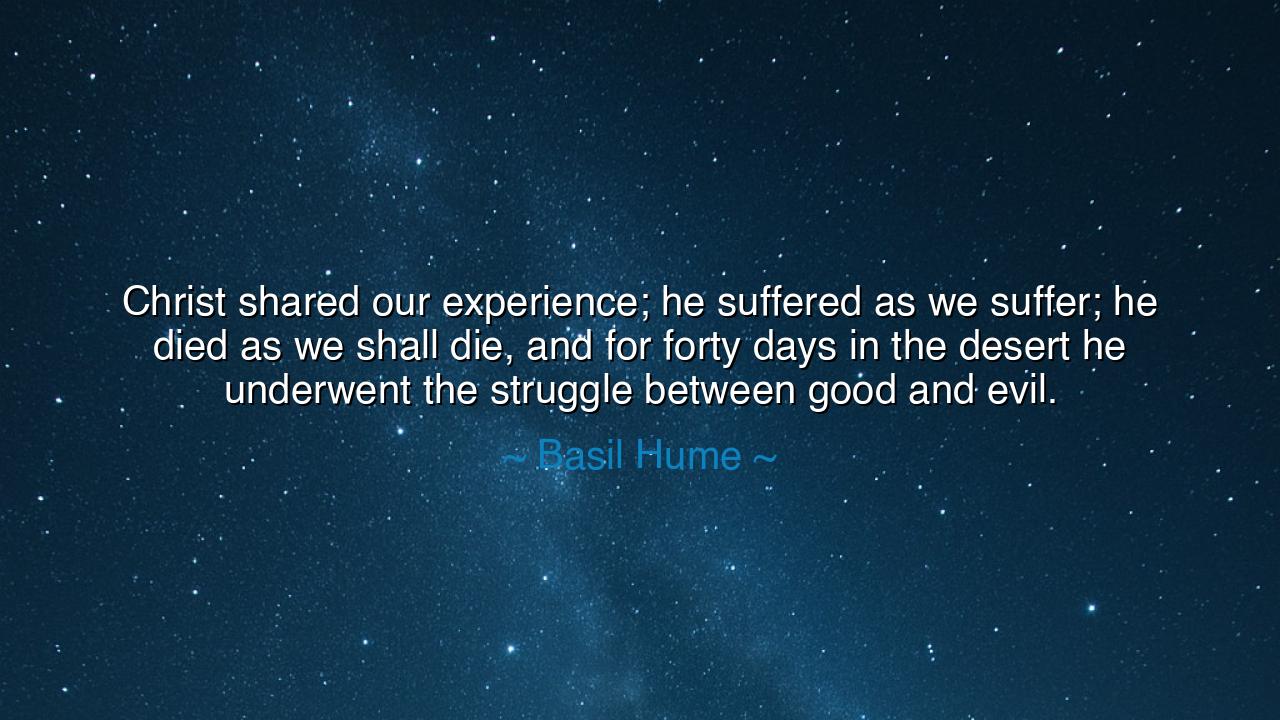
Christ shared our experience; he suffered as we suffer; he died
Christ shared our experience; he suffered as we suffer; he died as we shall die, and for forty days in the desert he underwent the struggle between good and evil.






The words of Basil Hume — “Christ shared our experience; he suffered as we suffer; he died as we shall die, and for forty days in the desert he underwent the struggle between good and evil” — shine as both a theological truth and a profoundly human meditation. They were spoken by a shepherd of souls who sought to remind humanity that the divine is not distant. Christ, in His incarnation, did not watch human pain from the safety of heaven; He entered it fully, breathing the dust of the earth, tasting hunger, sorrow, and fear. Through this act, God became man, not only to redeem humanity, but to understand it — to show that even in weakness, suffering, and temptation, the divine presence abides.
Basil Hume, the Cardinal Archbishop of Westminster in the late twentieth century, spoke these words to a generation often numbed by comfort yet haunted by loneliness. His message was not an abstract sermon; it was a reminder that Christ’s divinity is revealed through His humanity. The forty days in the desert, when Jesus faced the Tempter, represent the universal human struggle — the battle between light and shadow that lives within every soul. In the wilderness, Christ met the voice that whispers to all of us: “Take the easier path, the one of power, pleasure, and pride.” And in that battle, He sanctified human conflict itself — showing that to resist evil is not weakness, but the highest form of strength.
This teaching is as old as the Gospels and as timeless as the human heart. When Hume says that Christ “suffered as we suffer,” he tears down the wall between heaven and earth. He reminds us that divine love is not aloof — it walks beside us in our darkest nights. The carpenter from Nazareth was not spared the cold of rejection, the sting of betrayal, or the agony of death. In His pain, He joined every broken soul who ever cried, “Why have You forsaken me?” Yet even in that cry, there was faith — faith that sorrow can be transformed into glory, that death can become the doorway to resurrection.
We can see this truth reflected in the story of Maximilian Kolbe, the Polish priest imprisoned in Auschwitz. When a fellow prisoner was chosen to die, Kolbe stepped forward and offered his life in the man’s place. In that moment, he mirrored the Christ who “died as we shall die,” but did so out of love. In the starvation bunker, as death approached, Kolbe led the condemned men in prayer and song. His suffering was not defeat, but participation in the suffering of Christ — a witness that love, when united with sacrifice, transcends even the cruelty of evil.
The forty days in the desert also serve as a mirror of every human life. Each of us must wander through seasons of emptiness, where comfort is stripped away and only the voice of conscience remains. In those moments, we face our own temptations — to despair, to pride, to surrender to ease instead of endurance. Yet the desert is also sacred ground. It is the place where faith is refined, where illusions fall away, and where the soul learns the language of silence. When Christ endured the wilderness, He showed that temptation itself can become the forge of holiness.
In Basil Hume’s reflection, the suffering and death of Christ become not only divine mysteries but human lessons. They tell us that to live rightly is to face suffering with courage, to meet evil not with hatred but with steadfast faith, and to walk through the desert knowing that God walks with us. Each trial we endure, each sacrifice we make, becomes a participation in that same eternal story — the story of light confronting darkness and emerging unbroken.
The lesson, therefore, is not to fear suffering, but to see within it a sacred purpose. When pain comes, let it teach compassion. When temptation rises, let it awaken vigilance. When death approaches, let it remind us that life is not extinguished, only transformed. Basil Hume’s words invite us to see in our own struggles the reflection of the Christ who shared them — who turned agony into redemption, loneliness into love, and mortality into immortality.
Therefore, let all who hear this teaching remember: you are not alone in your pain, your doubt, or your trials. The Son of God has walked your path before you. In your suffering, He suffers; in your perseverance, He triumphs; and in your death, He promises resurrection. So when you face your desert, lift your heart and whisper, as He once did — “Not my will, but Thine be done.” For in that surrender lies the secret of all victory: that from the ashes of suffering, the soul shall rise renewed, bearing the image of the eternal Christ who conquered evil not by power, but by love.






AAdministratorAdministrator
Welcome, honored guests. Please leave a comment, we will respond soon